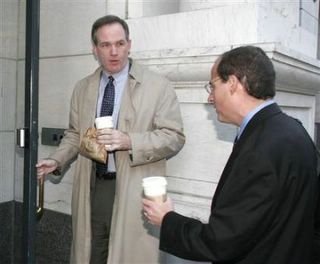
Special Counsel Patrick Fitzgerald (L), who says he doesn't photograph well, arrives at his Washington office October 27, 2005. (REUTERS/Micah Walter)

We must be able to let things happen in the psyche. For us, this actually is an art of which few people know anything. Consciousness is forever interfering, helping, correcting, and negating, and never leaving the simple growth of the psychic processes in peace. It would be simple enough, if only simplicity were not the most difficult of things.
---Carl Gustav Jung
To know that you do not know is the best.
To pretend to know when you do not know is a disease.
---Lao Tzu
Give me, kind Heaven, a private station,
A mind serene for contemplation.
---John Gay
I like to maintain dialogue with people of conservative philosophies, and several get these dispatches I send to cyberspace from time to time. Apparently a few even read them and sometimes lash back when they get mad. This is OK because usually there are other things at the heart of our friendship...and we just go back to those topics. I'm not being demeaning because there are elements of the conservative view, including the basic tenets of Hobbes, that are very convincing to me. I like best to talk with conservatives because I may be wrong about things and they help me be the first to know when I am.
There are two things I know about conservatives that come to mind this morning. One is they allow more secrecy in planning and government than I like or agree with. They respect the sanctity of the huddle. I must admit the intrusion of television technology onto the playing field can spoil the fun. I do not want to learn what the next pitch is going to be, or what the manager just whispered into the coach's ear. But politics is not a game to me, and if Cheney's energy cronies have carved up the world for their financial gain, using the public office of the Vice Presidency to do it, I want to know!
But the second conservative conviction that I think of today I do agree with and respect tremendously. Conservatives believe in playing by the rules. Fascists don't. They believe in making up rules by "necessity" as they go along. And so conservatives I've been talking to are anticipating the announcements by Fitzgerald today as much as I am. When Miers withdrew yesterday one such associate said to me, "Now we'll get a nominee to replace her so far to the right there won't be a confirmation before Christmas!" His remark helped temper my excitement.
The left is going wild on the Internet at this hour. I understand it. I woke up at 3 and had to get down to the computer to read the news. Some of you write or tell me you like it when I chart where I've been because it saves you time. Google News is featuring well over 2000 entries at this hour on who in the White House is about to be indicted, and an extension of the grand jury investigation for more about Karl Rove. Yahoo is carrying the basic AP story http://news.yahoo.com/s/ap/20051028/ap_on_go_ca_st_pe/cia_leak_investigation , but Reuters' Adam Entous kept updating his coverage until after midnight sometime. You can type in www.reuters.com and find yourself with the latest news, but I like Entous' earlier story which appeared on The Boston Globe site last night http://www.boston.com/news/nation/washington/articles/2005/10/27/leak_case_announcement_seen_friday/ . It also sums up The New York Times story, appearing in this morning's edition, that says Karl Rove will not be charged today because Fitzgerald is looking for more.
Another excellent summary I think is at BradBlog http://www.bradblog.com/archives/00001956.htm#comments . There are lots of hyperlinks there to lead your curiosity to the original sources. The most significant I think is the reference to a dispatch from Murray Waas at the National Journal http://nationaljournal.com/about/njweekly/stories/2005/1027nj1.htm . Here we learn, "Vice President Cheney and his chief of staff, I. Lewis 'Scooter' Libby, overruling advice from some White House political staffers and lawyers, decided to withhold crucial documents from the Senate Intelligence Committee in 2004 when the panel was investigating the use of pre-war intelligence that erroneously concluded Saddam Hussein had weapons of mass destruction, according to Bush administration and congressional sources.
"Among the White House materials withheld from the committee were Libby-authored passages in drafts of a speech that then-Secretary of State Colin L. Powell delivered to the United Nations in February 2003 to argue the Bush administration's case for war with Iraq, according to congressional and administration sources. The withheld documents also included intelligence data that Cheney's office -- and Libby in particular -- pushed to be included in Powell's speech, the sources said. " While still at BradBlog, especially those of us in Ohio, be sure to check out his writeup of Tom Noe's 3 count indictment of money laundering for Bush and Blackwell http://www.bradblog.com/archives/00001954.htm#comments . Dana sent this out to her list already last night.
If you want to get farther out, brace yourself for Arianna Huffington's blog, which actually is a legion of liberal bloggers http://www.huffingtonpost.com/ . The latest headlines and links to those sites are also there, and lots of photos. Her own entry today is about Macbeth and Bush and how they both lost their mojo. Well...you catch the drift.
The piece that captured most of my attention was an analysis of the whole Bush collapse by Tom Englehardt, who attended both Yale and Harvard and is involved, I guess, in a couple liberal thinktanks and publishing projects. He maintains something called TomDispatch http://tomdispatch.com/index.mhtml and yesterday put out this essay that TruthOut and a number of others have picked up http://tomdispatch.com/index.mhtml?pid=31576 . Clearly Englehardt is a bit on edge himself , as he chronicles how hard he's been working over the past year for this moment. Yeah well, haven't we all? But further into the piece he gets going~~~
"In all their guises -- in relation to the media, the federal bureaucracy, and other countries -- they actually were dominating isolationists. They took a once honorable Republican heartland tradition -- isolationism -- turned it on its head and thrust it into the world. They acted in Iraq and elsewhere as armed imperial isolationists. Where the elder Bush and Bill Clinton were multinationalists and globalizers; they were ultra-nationalists and militarists, focused only on the military solution to any problem -- and damn the torpedoes, full speed ahead!
"But when you are a cabal, using such close-to-the-breast, not to say mom-and-pop, methods of ruling, and you falter, whether in Iraq or at home, unilateralism becomes weakness. And when it turns out that what you rule is the 'last superpower' and you've sidelined, pacified, or punished large numbers of people in the vast, interlocking worlds of the governmental bureaucracy and the media, your enemies still retain the power to strike back.
"When something closer to the full story of our moment is known, I suspect we'll see more clearly just how the bureaucracy began to do so (along with, as in this week's New Yorker magazine in the person of Brent Scowcroft, the old multinational ruling elite). In the meantime, it's clear that what the potential implosion moment awaited was the perfect storm of events now upon us. If this moment were to be traced back to its origins, I would, for the time being, pick the spring of this year as my starting point and give the mainstream media -- anxious, resentful, bitter, cowed, losing audience, and cutting staff -- their due. The Bush slide has been a long, slow one, as the opinion polls indicate; but like that famed moss-less rolling stone, it picked up speed last spring as the President's approval ratings slipped below 50%, and then in the ensuing months plunged near or below 40%, putting him at the edge of free-fall.
"If there's one thing that this administration and Washington journalists have in common, it's that both groups parse opinion polls obsessively; so both saw the signs of administration polling softness and of a President, just into a second term, who should have been triumphant but was failing in his attempt to spend what he called his 'political capital' on social security 'reform.'
"Vulnerability, it gets the blood roaring, especially when it seeps from an administration so long feared and admired as the 'most disciplined' and 'most secretive' in memory, an administration whose highest officials (as the Plame case showed) regularly whacked their opponents with anything at hand and then called on their media allies, always in full-battle-mode, for support. Probably the key moment of weakness came in August, when Cindy Sheehan ended up in that famed ditch at the side of a road in Crawford, Texas, and the President and his men -- undoubtedly feeling their new-found vulnerability, anxious over an Iraq War gone wrong and the protesting mother of a dead soldier so near at hand -- blinked."
I hope this has helped you with your Friday morning and the announcement to come later today. Enjoy it, especially if it's payday besides! And get your chores done tomorrow.




